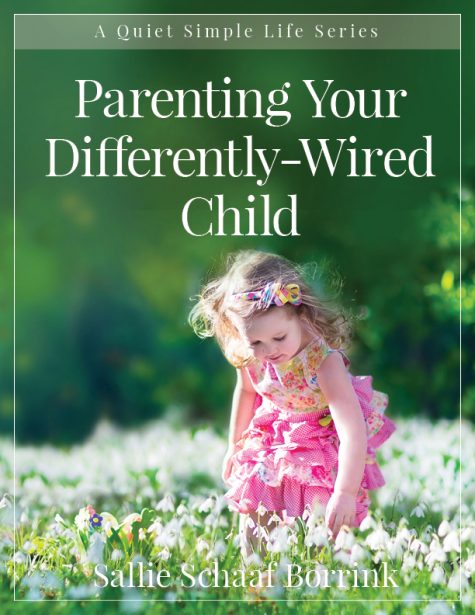In our home, we are homeschooling a child with slow processing speed. In her specific case, it is of both the visual and auditory varieties. We’ve known this for several years and have implemented many accommodations along with way.
If you are new to my website and would like some background, please check out these posts. In our situation, the bottom line is homeschooling is the best fit for our daughter given her strengths and weaknesses. As the doctor who tested her said, the classroom learning environment would be pretty much the very worst option.
- Should I Have My Gifted Child Tested?
- No One Understands Your Child Like You – The Downside of Gifted Child Testing
There are many more related posts under:
- Gifted & Twice-Exceptional (2e) – Homeschooling
- Gifted & Twice-Exceptional (2e) – Parenting For Christians
What Is Slow Processing Speed?
Slow processing speed is exactly what is sounds like. This is a child (or adult) who takes a little extra time to mentally process something. Because it takes the child longer to process information, it takes the child longer to respond. If she has problems with visual processing, then it involves needing extra time for the brain to process what she is seeing. If it is auditory, then her brain needs extra time to process what she is hearing.
Slow processing speed has nothing to do with intelligence. It’s not laziness. It’s not about not trying hard enough or not paying attention. It’s simply a brain that doesn’t move as quickly as we think is “normal” and expect in specific situations.
Parenting a Child With Slow Processing Speed
If a parent doesn’t understand that this is an issue, he might assume the child is being uncooperative or disobedient. That isn’t necessarily the case. The child simply can’t keep up with the expectations before her. In fact, imagine a small child with undiagnosed slow processing speed being raised by parents who expect immediate, unquestioned, and cheerful obedience. My heart breaks for that child.
Shaming or punishing a child with slow processing speed is cruel. The adult is quite literally asking her to do something her brain is not capable of doing. This then creates feelings of anxiety which only worsens the ability to process whatever is at hand. What a child like this needs is parents with a great deal of patience who are willing to slow down to her brain’s speed.
Parenting a Child With Slow Processing Speed
Every child with slow processing speed is different. Our daughter may struggle with something another child does not and vice versa. For example, even though our daughter has processing issues, she has an extremely quick wit. She can come back with a witty reply almost instantaneously. So whatever makes that part of her brain different from some of the other areas means that there is no processing issue there. Another thing we’ve observed is that participating in a conversation with multiple people can be very challenging if it is moving quickly. But watching a video (with the closed captioning on) is usually no problem at all.
When she was younger, I had to train myself to slow down and let her answer. If I asked her something, I need to be quiet and wait. Not jump in with more information. Not prompt her. Just ask and wait. It could be everyday things around the home or things related to homeschooling. I had to learn to wait silently.
Busy places can be overwhelming because there is too much to process. This came into play when selecting a church. So many churches today are a terrible fit for someone with processing issues. They are big, busy, and overstimulating. We had to find something completely different.
It was imperative that we advocate for Caroline. For example, I’ve made sure that other adults who work with her understand that she frequently takes a few extra seconds to process and formulate an answer. If called on in a group setting, it takes her more time than the average child or teen. Most adults are glad for the information and happy to do what she needs. They simply need to be told whether it is at church, homeschool co-op, or another group activity.
Homeschooling a Child With Slow Processing Speed Accommodations
We have adapted our homeschooling process to meet our daughter’s needs. This has evolved over the years as she has grown. These changes have become part of our family life. We don’t even think about them any longer because that is simply the way we do life together. It is only when needing to conform to expectations outside our home that we remember not everyone functions the same way.
Processing issues have meant that some opportunities will never work for her. Although she greatly enjoyed her homeschool co-op when she was younger, it no longer worked as she went through middle school and high school. Most of the classes are done in a lecture, discussion, and test style. They are just like traditional school and so they aren’t an option. So processing issues have meant less options and opportunities.
Here are some things we do differently in our homeschool.
- Minimal distractions around us while doing our studies. We work in the same place every day and the room is quiet.
- Short lessons, short sessions, and longer breaks each day.
- No timed math quizzes or fact memorization. After practicing math facts for years and in various formats, we simply stopped. Immediate recall of math facts is an area where some children with slow processing speed simply do not ever excel or even succeed.
- Simple and brief instructions (not multi-step)
- Lots of conversation/discussion for evaluating content mastery instead of written tests and exams
- Using cheat sheets and taking open book quizzes in Latin. Repetition is important for many children with slow processing speed. Our goal is to learn Latin, not conform to how some people think Latin “should” be learned.
- Reading a great deal of her work out loud and discussing it as we go. Extended silent reading is a terrible fit for her processing issues.
- Zero note-taking
- Making use of video courses that are a good fit
Those are some things off the top of my head. If I think of any more, I’ll add them to the list.
The bottom line is children should be provided the opportunity to succeed in a way that fits their unique needs. For children with slow processing speed, making some simple adjustments can mean the difference between believing they are a failure and realizing they are intelligent even if they can’t “perform” in the way the industrialized school factory system has convinced everyone they should.



















 Morning Hope – Jesus Promises the Holy Spirit
Morning Hope – Jesus Promises the Holy Spirit
Some of this sounds very familiar to me! How did you come to know that her processing speed was an issue? Did you just go by observation or was there something more formal? Thanks!
Hi Ayli,
We did go through professional testing and I honestly can’t remember if the processing speed was something I had figured out before or not. I don’t think I had. I asked David if he remembered and he thinks that was one of the things we learned through the testing.
What’s interesting re: the visual processing issues is that her primary area of giftedness is Visual-Spatial. Like I said in the post about her testing results, she had an unusual set of results even for a 2e child. lol
Thank you for your comment!
Sallie
I wanted to thank you for sharing your parenting journey. I’ve been reading your blog off and on for a while, and your story resonates so much with my own with my eight year old daughter. My daughter, although undiagnosed, has ADHD,is highly sensitive, and very bright. Homeschooling has been a struggle both both of us as it takes longer for her to process new material and needs a lot of repetition. Your posts gives me hope that we are doing the right thing for her, and as a fellow introverted parent, I see you as an inspiration.
Hi Tasha,
Thank you for the kind comments. They truly bless me and encourage me to keep writing about these topics.
Just keep going every day and know that it will be steps forward and steps backwards. Love your child with patience and grace every day as much as you can. Do what you know she needs whether other people understand it or not. Keep the end goal in mind – you are raising an adult. In my opinion, the mother-child relationship trumps everything when homeschooling a 2e child. It has to. These children need all of the encouragement, security, and love they can get from their parents.
I’ve been going back and reading some of my own posts from several years ago to help me think through what I want to write about now. I read this one today and watched the short part of the video. It was a good reminder of how far we’ve come and what I still need to keep doing over the next few years.
https://sallieborrink.com/embracing-journey-parenting-2e-child
Thank you for saying hello!
Sallie